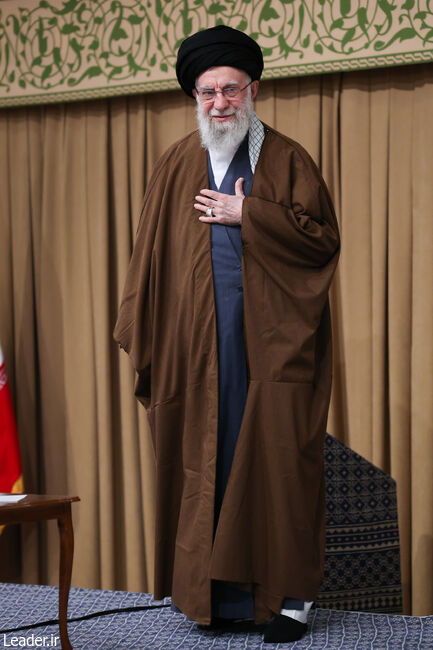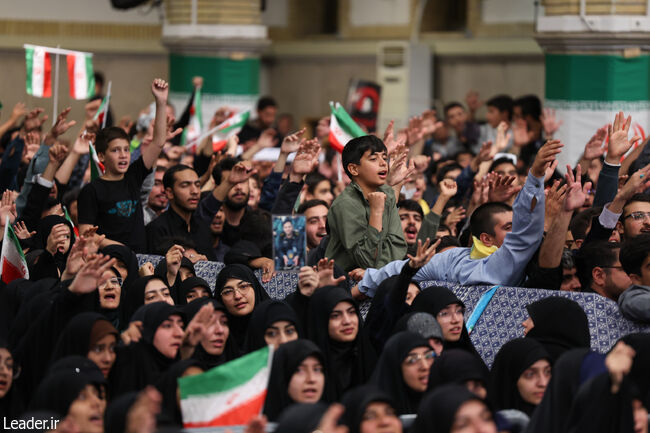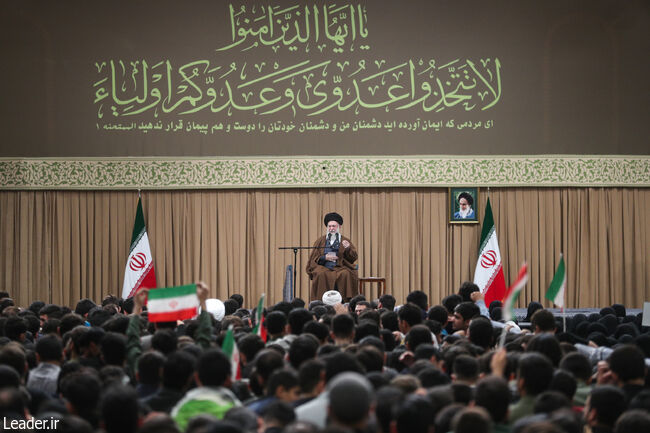On the eve of November 4th, Students' Day and the National Day of Resistance against Global Arrogance, Ayatollah Khamenei, the Leader of the Islamic Revolution, met that morning with thousands of high school and university students as well as families of the martyrs of the 12-Day Imposed War. He described the anniversary of the seizure of the U.S. embassy, known as the "Den of Conspiracy" against the Islamic Revolution on 13th of Aban 1358 (4th November 1979), as a day of "honour and victory" and a day that "revealed the true nature of the arrogant American government." He emphasised the need to preserve this day in the nation's memory and outlined the background of America's enmity toward the Iranian people, which began with the coup of 28th Mordad 1332 (August 19th 1953) and continues to this day. He said, "The disagreement between the Islamic Republic and the United States is inherent and stems from the clash of interests between two opposing currents, that of America and that of the Islamic Republic. Only if the United States completely ends its support for the accursed Zionist regime, withdraws its military bases from the region, and refrains from interfering in its affairs, will any American request for cooperation with Iran become even remotely worthy of consideration, not in the near, but only in the distant future."
The Leader of the Revolution also said, "Resolving many of the country's challenges and safeguarding it can only be achieved by becoming powerful, and through strengthening and enhancing managerial, scientific, military, and motivational capabilities, and that the government must act with determination and vigour in the areas within its responsibility."
While outlining the history of America's hostility toward the Iranian nation in the meeting and explaining the dimensions of the historic event of the takeover of the American Den of Spies on 13 Aban 1358 (November 4, 1979), Ayatollah Khamenei said, "The seizure of the U.S. embassy by the youth can be examined from two perspectives: historical and identity-based."
From the historical perspective, he described the 13th of Aban 1358 and the courageous move by the students in seizing the U.S. Embassy as a day of honour and victory for the Iranian nation. He noted, "In Iran's history, there are both days of victory and days of weakness and decline, both of which must remain preserved in the memory of the nation."
Ayatollah Khamenei cited the annulment of the colonial Tobacco Concession by Mirza Shirazi and the revocation of the Wuthūq al Dowlah Agreement through the efforts of Modarres and his companions as examples of moments of national ascendancy and joyful milestones in contemporary history.
He strongly advised students, scholars, and readers to study and discuss these events. He said, "Combined with preserving such uplifting episodes, care must also be taken not to forget the bitter ones, such as the British-backed coup of 1299 (1921) carried out by Reza Khan, his subsequent rise to kingship, and the ensuing catastrophes, hardships, unprecedented tyranny and foreign domination that afflicted the country."
He emphasised the necessity of recording the events of the 13th of Aban 1358, which marked the seizure of the U.S. Embassy in the nation's history and national consciousness, as well as ensuring public awareness of it. In explaining the identity-related dimension of this great event, he said, "The seizure of the Embassy revealed the true identity of the United States government, as well as the real identity and essence of the Islamic Revolution."
Referring to the Qur'anic origin of the term "istikbār" (arrogance), the Leader of the Revolution defined it as self-superiority, saying, "Sometimes an individual or a government regards itself as superior, yet does not encroach upon the interests of others; in such a case, it provokes no hostility. However, sometimes, as with Britain in the past and America today, it arrogates to itself the right to interfere in the vital interests of nations, to dictate to them, to establish military bases in countries whose governments are weak and whose people lack vigilance, or to plunder the oil and resources of nations. This is the very arrogance (istikbār) we oppose and against which we raise our voices."
In outlining the history of America's hostility toward the Iranian nation, he said, "Following the Constitutional Revolution, for about forty years Iran was either mired in chaos and turmoil, subjected to the interference of foreign powers, or oppressed by the brutal despotism and ruthless dictatorship of Reza Khan until around the year 1329 (1950), when, by God's grace, the national government of Dr. Mossadegh came to power. It stood up to the British and succeeded in nationalising the country's oil, which had been virtually handed over to them for next to nothing."
Ayatollah Khamenei recalled the conspiracies of Britain and its allies to undermine Mossadegh's government, and noted Mossadegh's naivety and heedlessness in seeking America's help to rid Iran of British domination. He added, "The Americans smiled at Mossadegh, but colluded with the British behind his back to stage a coup, overthrow the national government, and bring the fugitive Shah back to Iran."
He described the overthrow of the national government as a severe blow to the Iranian nation and added, "Our people came to know America and its arrogant, dangerous nature through the coup of 28 Mordad 1332 (August 19, 1953). After the coup and the Shah's return, twenty-five years of harsh and brutal dictatorship under Mohammad Reza continued, supported and assisted by the United States."
The Leader of the Revolution described the U.S. Senate's hostile resolution as America's first confrontation with the Islamic Revolution. Referring to the public outrage that arose when Mohammad Reza Pahlavi was admitted into the United States, he added, "The Iranian people felt that by giving refuge to Mohammad Reza, the Americans were seeking to repeat the coup of 28 Mordad and pave the way for his return to Iran. This anger brought people into the streets, and part of these popular demonstrations, joined by university students, resulted in the takeover of the U.S. Embassy."
He said that the students' initial intention was to occupy the embassy for only two or three days, just in order to convey the Iranian people's anger to the world. However, he noted, "The students discovered documents inside the embassy revealing that the matter was far deeper than anyone had imagined. The U.S. Embassy was, in fact, a centre of conspiracy and plotting aimed at destroying the Revolution."
Referring to the usual function of embassies worldwide, which is collecting information and relaying it to their home countries, the Leader said, "The issue with the U.S. Embassy was not merely information gathering; rather, by setting up a conspiracy room, they were organising remnants of the previous regime, elements of the army, and others to act against the Revolution. Once the students realised this, they decided to keep the embassy under their control."
He did not consider the idea that the seizure of the embassy marked the beginning of U.S.-Iranian problems to be accurate. He said, "Our problem with America began on the 28th of Mordad 1332, and not on the 13th of Aban. Moreover, the takeover of the embassy led to the uncovering of a major conspiracy and danger against the Revolution, and by compiling and analysing the documents, the students succeeded in exposing the true nature of that plot."
Ayatollah Khamenei said that the main reason for the hostilities and various conspiracies against the Revolution was "the slipping away of a sweet morsel from America's throat", which signified the end of American domination over Iran's resources. He said, "They were not willing to easily let go of Iran; therefore, from the very beginning, they began their provocations not only against the Islamic Republic but against the Iranian nation itself."
He cited the continuous U.S. hostility toward the Iranian people throughout the years following the Revolution as proof of the validity of the Great Imam's saying, " Shout all your protests against America!" He continued, "Their hostility was not merely verbal. They employed every means at their disposal: sanctions, conspiracies, aiding the inherent enemies of the Islamic Republic, inciting Saddam to attack Iran and providing him with extensive support, shooting down an Iranian passenger airliner with 300 people on board, waging a propaganda war, and carrying out direct military strikes to harm the interests of the Iranian nation. This is because the arrogant nature of the United States is incompatible with the independent and revolutionary essence of the Islamic Revolution. The disagreement between the U.S. and the Islamic Republic is not tactical or situational; it is an essential and intrinsic opposition."
The Leader dismissed the claims of those who say that the slogan "Death to America" was the cause of America's hostility toward the Iranian people as distorting history. He added, "This slogan is not the reason for their enmity; America's problem with the Islamic Republic lies in an essential incompatibility and a fundamental conflict of interests."
Referring to the question some people ask, "We have not surrendered to America, but will we never have relations with it?" The Leader said, "First of all, America's arrogant nature accepts nothing short of submission. Every U.S. president has wanted this, though most would not express it openly, but the current President said it out loud, thus revealing the true face of America."
Ayatollah Khamenei said that expecting the Iranian nation to surrender despite its level of capability, its wealth, its intellectual and spiritual heritage, and its alert and motivated youth, is utterly meaningless. He added, "As for the distant future, one cannot predict; but at present, everyone must know that the remedy for many of our problems lies in becoming powerful."
Emphasising that the country must be made powerful, he added, "The government should act with determination in its respective domains, the armed forces in military affairs, and the youth in their studies and scientific work. For if the country grows strong and the enemy realises that confrontation with this powerful nation will bring not gain but harm, then the nation will indeed become secure. Therefore, military, scientific, managerial strength, and above all, the vitality and resolve of the youth, are essential."
Regarding some American statements expressing a desire for cooperation with Iran, the Leader of the Revolution in response said, "Cooperation with Iran is incompatible with America's cooperation and assistance to the accursed Zionist regime."
He described America's continued support, backing, and protection of the Zionist regime despite its disgrace and condemnation in world public opinion as utterly meaningless and unacceptable when paired with its request for cooperation with Iran. He added, "If America were to completely end its support for the Zionist regime, withdraw its military bases from the region, and cease its interference, then such a matter could be considered, though certainly not at present, nor in the near future."
In the concluding part of his remarks, Ayatollah Khamenei advised the youth to deepen their understanding and awareness of the country's fundamental political issues, past, present, and future, by forming circles of knowledge and studying both the bitter and sweet events of history. He stated, "Science must continue to advance in our country. Several years ago, our scientific movement and progress were excellent, but they have declined somewhat. University officials, researchers, and students must not allow the pace of the nation's scientific growth to slow down."
Emphasising the continued advancement of the country's military power, he said, "By God's grace, the military sector works tirelessly day and night and will progress even further, to show that the Iranian nation is a strong nation that no power can subdue or bring to its knees."
On the occasion when we remember Lady Fāṭimah and Lady Zaynab (peace be upon them), the Leader also advised the youth to follow these radiant exemplars in practice, saying, "Encourage those around you to reflect upon and learn from the conduct of these noble personalities."
Ayatollah Khamenei advised that for young people, it is essential to perform prayers as befitting God's righteous servants, that they regard hijab as a religious matter linked to the examples of Hazrat Zahra and Hazrat Zaynab, that they should build familiarity with the Quran through daily recitation, and that they should maintain a connection with spirituality. He added, "In this troubled age, our youth can only truly say 'Death to America' and stand firm before the power and threats of the Pharaohs of the time if they are inwardly, religiously, and spiritually strong, and rely upon divine power."
The Leader of the Revolution described the youth's continued heartfelt connection with their Lord as the source of the nation's sustained progress and its growing strength in confronting its enemies.



